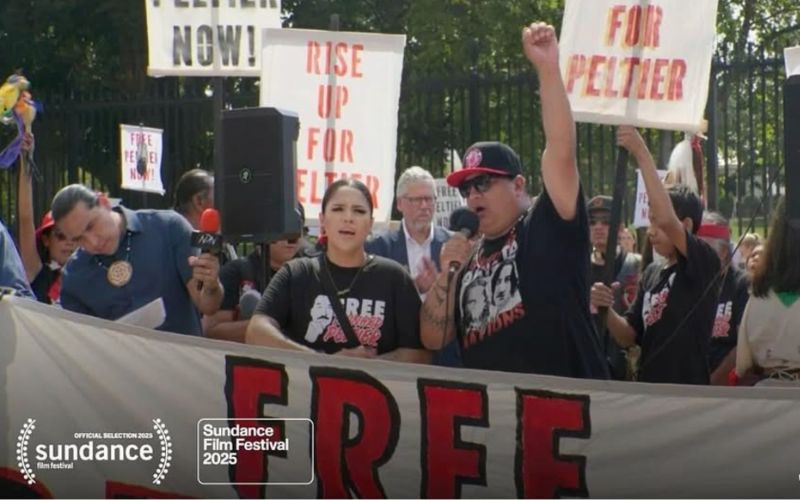
- Details
- By Kaili Berg
The Sundance Institute recently unveiled the lineup for the 2025 Sundance Film Festival, which will showcase 87 feature films and six episodic projects that promise daring storytelling and global perspectives.
Among the films in this year’s lineup are powerful portrayals of Indigenous experiences, including El Norte and Free Leonard Peltier.
Sundance Institute Senior Programmer Heidi Zwicker told Native News Online that the selection of films underscores diverse narratives in Native films.
“The films that we have this year indicate how much you can’t define what an Indigenous film should be like,” Zwicker said. “There’s such multiplicity in the stories and worlds these filmmakers present, even within a single community.”
The Festival will take place from January 23 to February 2, 2025, with screenings in Park City and Salt Lake City, Utah, as well as a curated online program accessible to audiences nationwide from January 30 to February 2.
Free Leonard Peltier, co-directed by Jesse Short Bull (Oglala Lakota) and David France, is a documentary that dives into the life and legacy of Leonard Peltier, a leader of the American Indian Movement who has been imprisoned for 50 years following a controversial conviction.
Zwicker described the film as “rich, well-researched, and deeply emotional,” emphasizing its timeliness as Peltier’s case gains renewed attention in the fight for clemency.
Gregory Nava’s El Norte follows Indigneous siblings Rosa and Enrique as they flee Guatemala after their family is murdered in a government-led massacre during the Guatemalan Civil War. Their journey to the U.S. becomes a struggle for survival amid the realities of immigrant life.
Profits from ticket sales directly support Sundance Institute’s year-round initiatives, including labs, residencies, fellowships, and educational programs through Sundance Collab. These programs empower thousands of artists annually.
Sundance’s Indigenous Program, led by Adam Piron (Kiowa/Mohawk), is a vital part of this mission, providing ongoing support to Native filmmakers.
“It’s a central part of our mission as an institute to uplift these artists,” Zwicker said.
In addition to the feature films, the 2025 Festival will present a wide array of short films, special talks, and immersive experiences. The annual fundraising gala, Celebrating Sundance Institute, presented by Google TV, will take place on January 24 at the Grand Hyatt Deer Valley.
The Sundance Film Festival Awards ceremony, recognizing outstanding achievements, will be held on January 31 in Park City.
The Festival will also highlight innovative works in science and technology, with the Alfred P. Sloan Feature Film Prize awarded to SALLY, a feature-length film screening in the Premieres category. The Short Film Program and a detailed schedule for the Festival will be announced later this month.
“Festivals play a crucial role in continuing to celebrate Indigenous voices and getting talented filmmakers more opportunities to share their work with audiences,” Zwicker said.
For audiences eager to engage with groundbreaking films and diverse perspectives, tickets for in-person and online screenings will go on sale on January 16 at 10 a.m. MT. Sundance Institute members will have early access to tickets, and a limited number of passes remain available.
More Stories Like This
Zuni Youth Enrichment Project Takes Top Emerging Artist Apprentices to Phoenix for Artistic Exploration and Cultural ImmersionFrom Dishwasher to Award-Winning Chef: Laguna Pueblo's Josh Aragon Serves Up Albuquerque's Best Green Chile Stew
Rob Reiner's Final Work as Producer Appears to Address MMIP Crisis
Vision Maker Media Honors MacDonald Siblings With 2025 Frank Blythe Award
First Tribally Owned Gallery in Tulsa Debuts ‘Mvskokvlke: Road of Strength’
Help us defend tribal sovereignty.
At Native News Online, our mission is rooted in telling the stories that strengthen sovereignty and uplift Indigenous voices — not just at year’s end, but every single day.
Because of your generosity last year, we were able to keep our reporters on the ground in tribal communities, at national gatherings and in the halls of Congress — covering the issues that matter most to Indian Country: sovereignty, culture, education, health and economic opportunity.
That support sustained us through a tough year in 2025. Now, as we look to the year ahead, we need your help right now to ensure warrior journalism remains strong — reporting that defends tribal sovereignty, amplifies Native truth, and holds power accountable.
 The stakes couldn't be higher. Your support keeps Native voices heard, Native stories told and Native sovereignty defended.
The stakes couldn't be higher. Your support keeps Native voices heard, Native stories told and Native sovereignty defended.
Stand with Warrior Journalism today.
Levi Rickert (Potawatomi), Editor & Publisher


